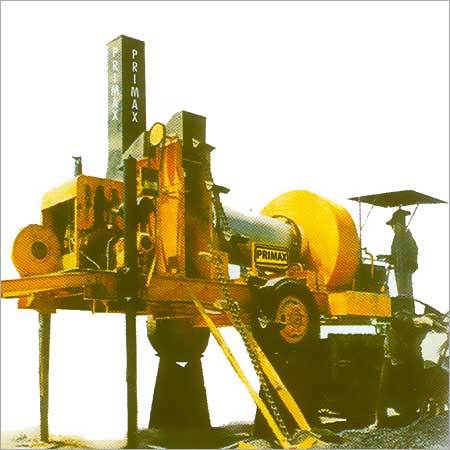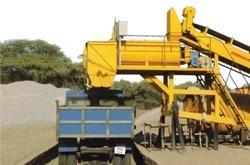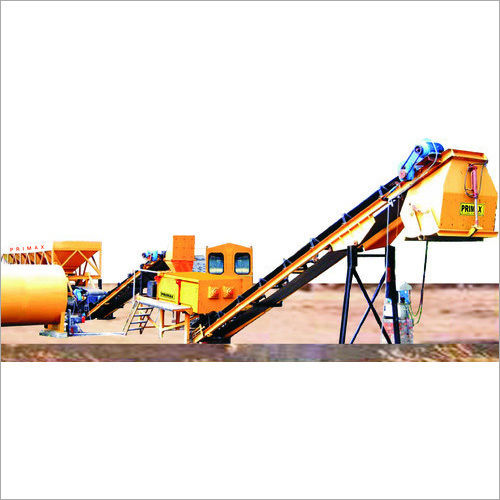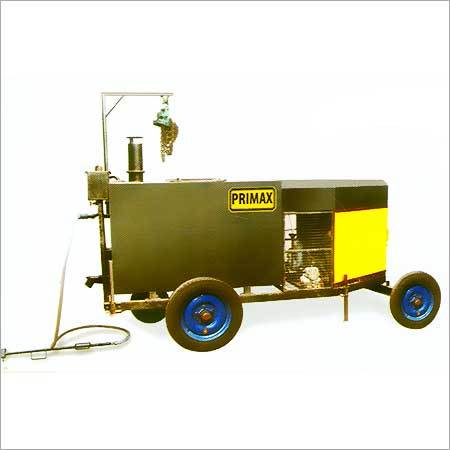Drum Mix Plant
Drum Mix Plant Specification
- Air Pressure
- 710 kg/cm2
- Compressor Type
- Rotary Vane
- Noise Level
- Below 85 dB
- Hole Size
- Custom as per design
- Coverage Area
- 300600 m2/hr
- Hopper Capacity
- 2.54 m3
- Tank Dimensions (Mm X Mm X Mm)
- 4000 x 2500 x 2300 mm
- Driven Type
- Electric/Diesel
- Fuel Type
- Diesel/FO
- Tank Material
- MS (Mild Steel)
- Mount Type
- Mobile/Stationary
- Working Width
- 2.53.5 m
- Temperature
- 140165C
- Type
- Drum Mix Plant
- Material
- Mild Steel
- Capacity
- 60120 TPH (Tons Per Hour)
- Computerized
- Yes
- Automatic Grade
- Automatic
- Cooling System
- Water Cooled
- Vibration Frequency
- 50-60 Hz
- Drum Diameter
- 1.22.2 m
- Power
- 90120 kW
- Size
- Standard
- Color
- Blue & Yellow
- Weight
- 1800025000 kg
- Dimension (L*W*H)
- 12000 mm x 2200 mm x 4000 mm
About Drum Mix Plant
Drum Mix Plant
Drum Mix Plant is a stand alone industrial system which is used for the preparation of best quality asphaltic mixture. It is designed and developed as per the industrial standards by using heavy engineering units. This construction machinery is capable to operate continuously for a longer period of time with high efficiency and without any risk of damages. It also consists of heavy duty conveyors for the transportation of large volume of raw materials to the batching unit for the efficient mixing of the substances.
Advanced PLC-Controlled Operations
This Drum Mix Plant features a fully automatic PLC control panel, enabling seamless control over the entire asphalt mixing process. The automated system enhances operator convenience, promotes safety, and optimizes plant efficiency. The control panel manages aggregate feeding, temperature, burner modulation, and mixing time, reducing human error and ensuring high-quality, consistent hot mix output.
Superior Aggregate Handling and Mixing
Equipped with a 600 mm wide conveyor belt and four individual feeders powered by AC drives, the plant efficiently manages aggregates of up to 80 mm. The continuous mixing cycle, combined with an optional hot mix storage silo of up to 50 tons, accommodates high-volume production, making it suitable for large roadworks, highways, and infrastructure projects.
Efficient Dust Control and Environmental Compliance
The integrated multicyclone dust collector system effectively removes particulates, maintaining air quality and meeting regulatory standards. With noise levels below 85 dB, the plant operates with minimal environmental disturbance, making it suitable for urban as well as rural settings. These features demonstrate a commitment to sustainability and workplace safety.
FAQs of Drum Mix Plant:
Q: How does the fully automatic PLC control panel improve plant operation?
A: The PLC control panel enables centralized management of all functions, including aggregate feeding, burner operation, temperature regulation, and mix discharge, ensuring consistent output and reducing manual intervention. This streamlines the process, enhances safety, and minimizes potential errors.Q: What benefits does the automatic modulating burner provide?
A: The automatic modulating burner precisely controls the heating process, maintaining temperatures between 140165C. This ensures optimum asphalt viscosity and quality, reduces fuel consumption, and supports operational efficiency for diesel or furnace oil (FO) use.Q: When is the hot mix storage silo recommended, and what capacity is available?
A: The hot mix storage silo is ideal for projects requiring continuous supply or batchwise delivery of asphalt. It is available as an optional feature with capacities up to 50 tons, allowing flexibility for different project scales and on-site storage needs.Q: Where can this drum mix plant be deployed, and what mobility options exist?
A: This plant can be used on road construction sites, highways, and infrastructure developments across urban and remote locations in India or abroad. It is available in both trailer-mounted (mobile) and stationary models, providing transport and installation flexibility.Q: What is the process for aggregate feeding and mixing in this plant?
A: Aggregates are precisely fed through four individual feeder bins, each equipped with an AC drive. The materials move via a 600 mm wide conveyor belt to the drum, where they are continuously mixed with bitumen in a controlled environment, resulting in a steady supply of hot mix asphalt.Q: How does the multicyclone dust collector contribute to safe operations?
A: The multicyclone dust collector efficiently removes dust and particulates generated during production. This not only protects the environment and complies with safety regulations but also improves air quality for workers on-site.Q: What are the key advantages of using this drum mix plant for asphalt production?
A: Benefits include high production capacity (60120 TPH), computerized automation, low noise emissions, continuous mixing cycles, robust build quality, and adaptability for different fuels and site conditions. These features yield uniform asphalt quality, lower operational costs, and high reliability for contractors and suppliers.

Price:
- 50
- 100
- 200
- 250
- 500
- 1000+
More Products in Road Construction Machinery Category
Mobile Hot Mix Plant With Pugmill System
Price 350000.00 INR / Piece
Minimum Order Quantity : 1 Piece
Dimension (L*W*H) : 9800 x 2400 x 3300 mm
Weight : 8500 kg
Size : Medium
Material : Heavyduty Steel Structure
Wet Mix Macadam Plant
Price 350000.00 INR / Piece
Minimum Order Quantity : 1 Piece
Dimension (L*W*H) : 12000 x 2600 x 4000 mm
Weight : 1535 Tons
Size : Standard/Custom as per requirement
Material : Mild Steel
Mobile Wet Mix Macadam Plant
Dimension (L*W*H) : Customizable
Weight : Approx. 10 Tons
Size : Standard
Material : Mild Steel

 Send Inquiry
Send Inquiry






